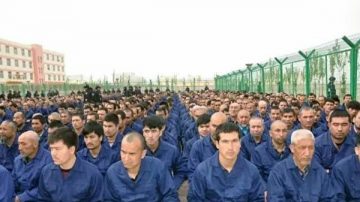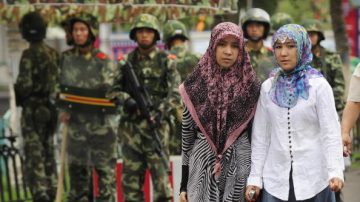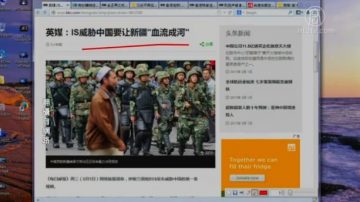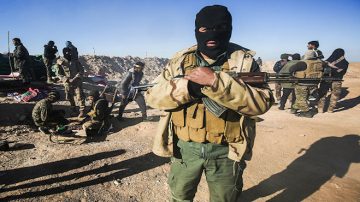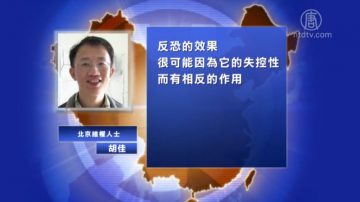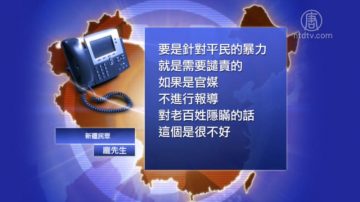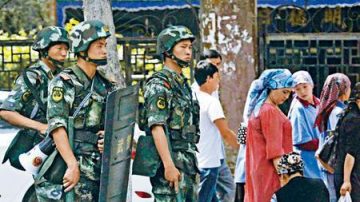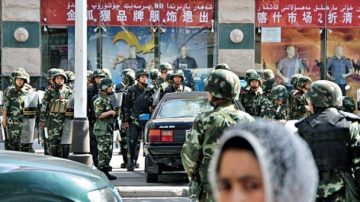【新唐人2013年07月01日訊】短短3天之內,大陸新疆地區連續發生了兩起群體衝突事件。中共政治局常委俞正聲帶領工作組,以「嚴打高壓」的姿態趕赴烏魯木齊。同時,坦克、軍車和上千全副裝備的武警齊齊出動演習。不過,當局這種強硬的打壓態度,是否有助於緩解和維族之間的緊張關係呢?一起來看看評論員的分析。
6月26號,新疆吐魯番鄯善縣連木沁鎮發生襲擊事件,中共喉舌《新華社》報導指稱,衝突造成35人死亡。2天後,位於南疆的和田地區,又發生一起爆炸事件,傷亡人數不詳。
29號清晨,中共政治局常委、政協主席俞正聲,帶領政法委書記孟建柱和公安部長郭聲琨等中央高官組成的工作組,抵達烏魯木齊召開幹部大會。
俞正聲在會上宣稱,要保持嚴打高壓的態勢防控社會。
同時,大陸各大媒體在集體沉默幾天後,開始宣傳當局的強硬立場。雖然在官方媒體平臺上難以了解事件的詳細情況,不過,民眾不難從官媒殺氣騰騰的話語中,感覺到當地的緊張氣氛。
美國「紐約城市大學」政治學教授夏明認為,中共當局對清真寺進行系統的滲透和控制從沒有間斷過。信仰伊斯蘭教的維族和鼓吹無神論的中共,長期以來就有內在的矛盾,暴力維穩無助於化解緊張的關係。
香港《明報》報導,29號當天,當局還出動數十輛武警裝甲車、防暴車和大批運載武警的卡車,前往烏魯木齊市中心的人民廣場集結,車上的武警全部頭戴頭盔、手持槍械。市區部分路段一度被交通管制,鬧市區和政府大樓前的戒備明顯增強,場面浩大近年罕見。
時事評論員林子旭:「中國現在處處是民怨,遍地是乾柴,這些年雖然民眾的維權抗爭一浪高過一浪,但是中共最害怕的就是真的有人很嚴密的組織起來,用武力對抗中共,新疆這幾天發生的事情就觸及到了中共最敏感的神經。」
《法國國際廣播電臺》報導認為,暴力手段自然是法理難容,但是在沒有獨立媒體對事件進行充分報導、公眾無從了解事件更多信息的情況下,中共當局將衝突定性為恐怖犯罪是避重就輕。
報導還引述「美國維吾爾人大會」負責人阿裡木•塞伊託夫的話指出,新疆事件讓人們看到的是,中共因為它的民族政策失敗造成的惡果,在努力挽回面子。
林子旭:「事情發生後,中共馬上把其定性為恐怖主義事件,只要是反對中共暴政的人或團體都能被中共貼上一些妖魔化的標籤,甚麼反華勢力、敵對勢力、恐怖份子、藏獨、臺獨、疆獨、蒙獨分子等等等等,不知道中共的敵人怎麼就這麼多?國內、國外無所不在。」
新疆地區近年來陸續發生多起流血衝突事件,都被中共當局定性為「恐怖襲擊」,最嚴重的是2009年的「七•五」事件,造成近200人喪生。
《法廣》文章指出,民族和諧共處是國家穩定的基礎,但不可能在中共一手高壓維穩,一手居高臨下的民族政策中實現。
採訪/常春 編輯/李明飛 後製/李勇
Standing Committee Member Yun Zhengsheng in Xinjiang: Urumqi Besieged by Armed CCP Troops
Within the space of three days, two social
conflicts have taken place in Xinjiang.
Yu Zhengsheng, a member of the Chinese Communist
Party (CCP) Standing Committee, has traveled to
Xinjiang to support a “crackdown with high-pressure”.
Meanwhile, thousands of armed police with tanks
and military trucks have appeared in Xinjiang.
Questions remain over whether the Chinese
Communist Party's tough position in Xinjiang will
help relieve tensions with the Uyghur community.
On June 26, an attack took place in Lianmuqin Town,
Shanshan County, Turpan, Xinjiang Province.
State-run “Xinhua News Agency” claimed that 35 people died.
2 days later, a bomb explosion took place
in the Hetian area in Southern Xinjiang.
The number of casualties is unknown.
On the morning of June 29, Yu Zhengsheng, a member
of the Standing Committee, and Chairman of the National
Political Consultative Conference, arrived in Urumqi.
Other members of Yu's party included Meng Jianzhu,
Sectary of CCP Politics and Law Committee,
and Guo Shengkun, Minister of Public Security.
After the officials arrived, they held a
conference with local government officials.
Yu Zhengsheng claimed that the strategy of a crackdown
and use of high-pressure, should continue to be adopted.
This is to maintain a stable society in Xinjiang.
Meanwhile, after a couple of days' of silence,
media in China have started communicating
the CCP's tough attitude towards Xinjiang.
Even if it's hard to know the details of the event from
state-run media, people can easily feel the tension in
Xinjiang from the threatening words used within reports.
Xia Ming, Politics Professor from New York City
University, stated that the CCP has never
stopped its systematic control over mosques.
The Uyghur ethnic group is Islamic,
while the CCP preaches atheism.
The conflict between them has always been present.
Violent crackdowns can never help relieve the tension.
Xia Ming: “The way the CCP deals with Islam is
similar to the way it deals with Tibetan Buddhism.
They try all means to force people away from their religion.
The CCP even claims that all religious activities are illegal,
including preaching, and activities held in mosques.
The Koran is listed as a forbidden book, and Muslims
are at risk if they teach their child the Koran at home.”
Hong Kong's “Ming Pao” reported that numerous trucks
with armed troops were sent to Renmin Square, Urumqi.
The troops all wear helmets, and are holding guns.
Some of the roads in the city were blocked, with the centre
of Urumqi, and government buildings, closely guarded.
This level of activity is rare.
Commentator Lin Zixu: “Discontent exists all over China.
In recent years, struggles for human
rights have taken place one after another.
Nevertheless, what the CCP fears most is that those
activities are systematically organized to turn against it.
What has occurred in Xinjiang over this
last couple of days has frightened the CCP.”
As reported by “Radio France International”
(RFI), terrorism is against the law.
However, without being investigated by independent media,
and without knowing more details, the CCP is evading
serious matters by defining the Xinjiang events as terrorism.
Alim Seytoff, Director of “The U.S. Uyghur Congress”,
stated that from recent events in Xinjiang, people can see
the disastrous effects caused by the CCP's ethnic policies.
Now the CCP is trying to save face.
Li Zixu: “After the conflicts took place, the
CCP immediately defined it as terrorist attack.
Anyone or any group that is against the CCP
dictatorship has always been labeled as evil.
This includes labels such as anti-China forces, hostile
forces, terrorists, Tibet-split forces, Taiwan-split forces,
Xinjiang-split forces or Mongolia-split forces, etc,”
In recent years, many conflicts that took place in Xinjiang
have been defined as “terrorist attack” by the CCP.
The most severe one was the “July Fifth” event in
2009, which caused the deaths of about 200 people.
RFI stated the harmonious co-existence of different
ethnicities is fundamental to the stability of nature.
However, this harmony can never be realized under the
CCP racial crackdowns and racial discrimination policies.
6月26號,新疆吐魯番鄯善縣連木沁鎮發生襲擊事件,中共喉舌《新華社》報導指稱,衝突造成35人死亡。2天後,位於南疆的和田地區,又發生一起爆炸事件,傷亡人數不詳。
29號清晨,中共政治局常委、政協主席俞正聲,帶領政法委書記孟建柱和公安部長郭聲琨等中央高官組成的工作組,抵達烏魯木齊召開幹部大會。
俞正聲在會上宣稱,要保持嚴打高壓的態勢防控社會。
同時,大陸各大媒體在集體沉默幾天後,開始宣傳當局的強硬立場。雖然在官方媒體平臺上難以了解事件的詳細情況,不過,民眾不難從官媒殺氣騰騰的話語中,感覺到當地的緊張氣氛。
美國「紐約城市大學」政治學教授夏明認為,中共當局對清真寺進行系統的滲透和控制從沒有間斷過。信仰伊斯蘭教的維族和鼓吹無神論的中共,長期以來就有內在的矛盾,暴力維穩無助於化解緊張的關係。
香港《明報》報導,29號當天,當局還出動數十輛武警裝甲車、防暴車和大批運載武警的卡車,前往烏魯木齊市中心的人民廣場集結,車上的武警全部頭戴頭盔、手持槍械。市區部分路段一度被交通管制,鬧市區和政府大樓前的戒備明顯增強,場面浩大近年罕見。
時事評論員林子旭:「中國現在處處是民怨,遍地是乾柴,這些年雖然民眾的維權抗爭一浪高過一浪,但是中共最害怕的就是真的有人很嚴密的組織起來,用武力對抗中共,新疆這幾天發生的事情就觸及到了中共最敏感的神經。」
《法國國際廣播電臺》報導認為,暴力手段自然是法理難容,但是在沒有獨立媒體對事件進行充分報導、公眾無從了解事件更多信息的情況下,中共當局將衝突定性為恐怖犯罪是避重就輕。
報導還引述「美國維吾爾人大會」負責人阿裡木•塞伊託夫的話指出,新疆事件讓人們看到的是,中共因為它的民族政策失敗造成的惡果,在努力挽回面子。
林子旭:「事情發生後,中共馬上把其定性為恐怖主義事件,只要是反對中共暴政的人或團體都能被中共貼上一些妖魔化的標籤,甚麼反華勢力、敵對勢力、恐怖份子、藏獨、臺獨、疆獨、蒙獨分子等等等等,不知道中共的敵人怎麼就這麼多?國內、國外無所不在。」
新疆地區近年來陸續發生多起流血衝突事件,都被中共當局定性為「恐怖襲擊」,最嚴重的是2009年的「七•五」事件,造成近200人喪生。
《法廣》文章指出,民族和諧共處是國家穩定的基礎,但不可能在中共一手高壓維穩,一手居高臨下的民族政策中實現。
採訪/常春 編輯/李明飛 後製/李勇
Standing Committee Member Yun Zhengsheng in Xinjiang: Urumqi Besieged by Armed CCP Troops
Within the space of three days, two social
conflicts have taken place in Xinjiang.
Yu Zhengsheng, a member of the Chinese Communist
Party (CCP) Standing Committee, has traveled to
Xinjiang to support a “crackdown with high-pressure”.
Meanwhile, thousands of armed police with tanks
and military trucks have appeared in Xinjiang.
Questions remain over whether the Chinese
Communist Party's tough position in Xinjiang will
help relieve tensions with the Uyghur community.
On June 26, an attack took place in Lianmuqin Town,
Shanshan County, Turpan, Xinjiang Province.
State-run “Xinhua News Agency” claimed that 35 people died.
2 days later, a bomb explosion took place
in the Hetian area in Southern Xinjiang.
The number of casualties is unknown.
On the morning of June 29, Yu Zhengsheng, a member
of the Standing Committee, and Chairman of the National
Political Consultative Conference, arrived in Urumqi.
Other members of Yu's party included Meng Jianzhu,
Sectary of CCP Politics and Law Committee,
and Guo Shengkun, Minister of Public Security.
After the officials arrived, they held a
conference with local government officials.
Yu Zhengsheng claimed that the strategy of a crackdown
and use of high-pressure, should continue to be adopted.
This is to maintain a stable society in Xinjiang.
Meanwhile, after a couple of days' of silence,
media in China have started communicating
the CCP's tough attitude towards Xinjiang.
Even if it's hard to know the details of the event from
state-run media, people can easily feel the tension in
Xinjiang from the threatening words used within reports.
Xia Ming, Politics Professor from New York City
University, stated that the CCP has never
stopped its systematic control over mosques.
The Uyghur ethnic group is Islamic,
while the CCP preaches atheism.
The conflict between them has always been present.
Violent crackdowns can never help relieve the tension.
Xia Ming: “The way the CCP deals with Islam is
similar to the way it deals with Tibetan Buddhism.
They try all means to force people away from their religion.
The CCP even claims that all religious activities are illegal,
including preaching, and activities held in mosques.
The Koran is listed as a forbidden book, and Muslims
are at risk if they teach their child the Koran at home.”
Hong Kong's “Ming Pao” reported that numerous trucks
with armed troops were sent to Renmin Square, Urumqi.
The troops all wear helmets, and are holding guns.
Some of the roads in the city were blocked, with the centre
of Urumqi, and government buildings, closely guarded.
This level of activity is rare.
Commentator Lin Zixu: “Discontent exists all over China.
In recent years, struggles for human
rights have taken place one after another.
Nevertheless, what the CCP fears most is that those
activities are systematically organized to turn against it.
What has occurred in Xinjiang over this
last couple of days has frightened the CCP.”
As reported by “Radio France International”
(RFI), terrorism is against the law.
However, without being investigated by independent media,
and without knowing more details, the CCP is evading
serious matters by defining the Xinjiang events as terrorism.
Alim Seytoff, Director of “The U.S. Uyghur Congress”,
stated that from recent events in Xinjiang, people can see
the disastrous effects caused by the CCP's ethnic policies.
Now the CCP is trying to save face.
Li Zixu: “After the conflicts took place, the
CCP immediately defined it as terrorist attack.
Anyone or any group that is against the CCP
dictatorship has always been labeled as evil.
This includes labels such as anti-China forces, hostile
forces, terrorists, Tibet-split forces, Taiwan-split forces,
Xinjiang-split forces or Mongolia-split forces, etc,”
In recent years, many conflicts that took place in Xinjiang
have been defined as “terrorist attack” by the CCP.
The most severe one was the “July Fifth” event in
2009, which caused the deaths of about 200 people.
RFI stated the harmonious co-existence of different
ethnicities is fundamental to the stability of nature.
However, this harmony can never be realized under the
CCP racial crackdowns and racial discrimination policies.

